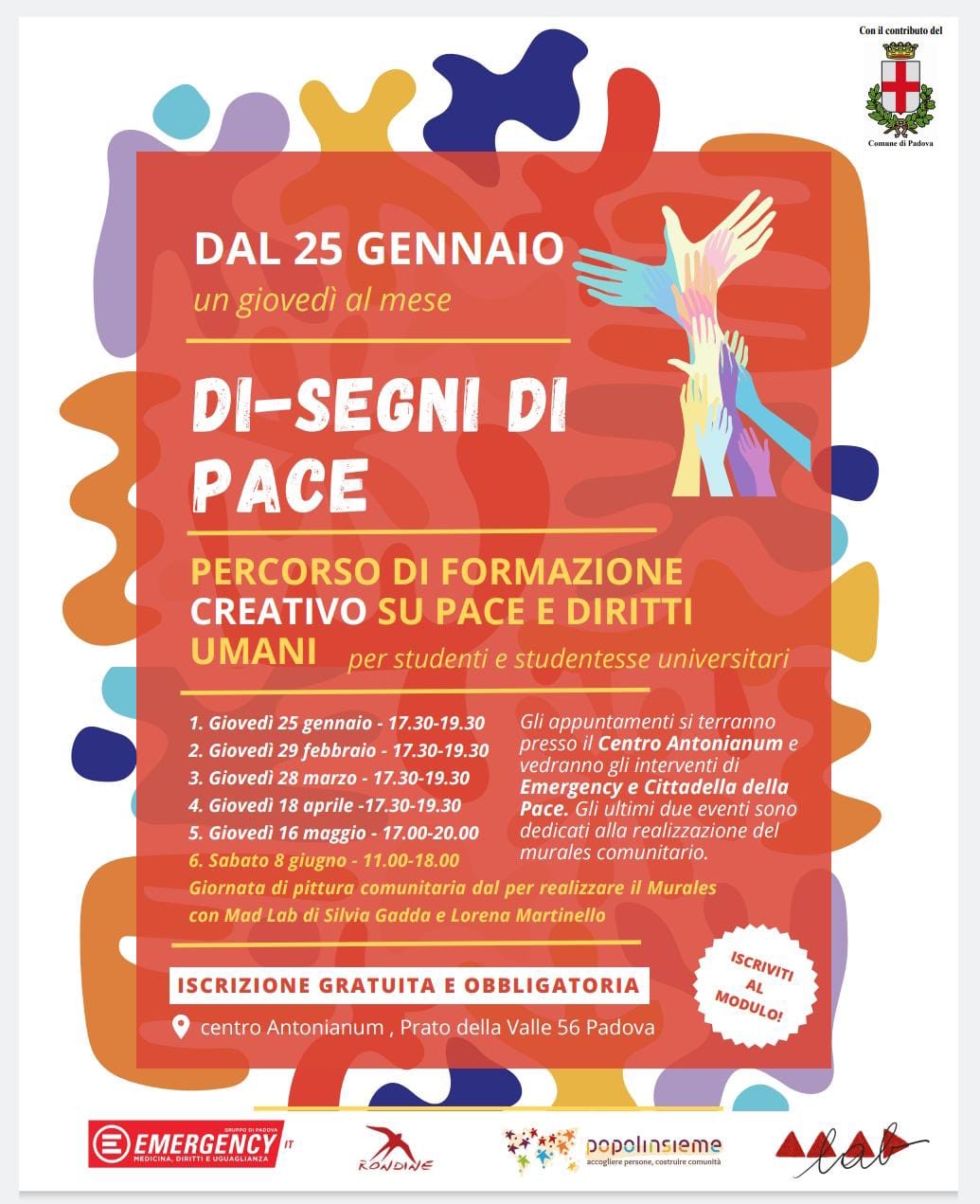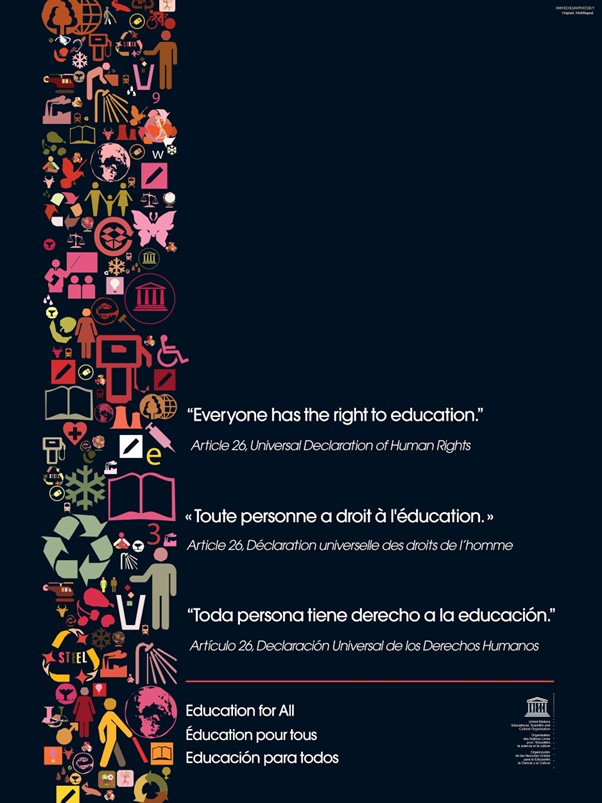“Di-segni di Pace”: reflecting about peace with refugee students

Table of Contents
Introduction
Globally, more than 120 million people are forced to live far from their homes due to war, persecution of various kinds and climate change (UNHCR 2024), and sadly these numbers keep growing, due to the many conflicts present worldwide and the constant effects of climate change.
Entering the educational system of the host country is clearly part of the resettlement process: the transformative power of education thus becomes tangible action, capable of providing new opportunities for troubled lives.
This is explicitly stated in Article 26, paragraph 1 of the Universal Declaration of Human Rights: “Everyone has the right to education. Education shall be free, at least in the elementary and fundamental stages. Elementary education shall be compulsory. Technical and professional education shall be made generally available and higher education shall be equally accessible to all on the basis of merit.””
Access to the education system is therefore a human right, and as such, inalienable. This is reaffirmed by UNHCR, which includes among its priorities the access of refugees to higher education, as an integral part of its protection mandate.
Yet, the figures related to access to higher education are decidedly inadequate. UNHCR reports that only 7% of refugees have access to higher education, compared to a global average of 42%. Thanks to various initiatives undertaken internationally (among them: DAFI scholarships, education pathways, the Manifesto on an inclusive university), the numbers are fortunately increasing, however, there is still much work to be done to achieve UNHCR's goal of enrolling 15% of refugees in universities by 2030.
The Association Popoli Insieme, the Municipality of Padua and the University of Padua are working together to create many different opportunities for refugee students. Among the various activities offered, the project “Di-segni di Pace” represents a successful experience of inclusion, and a contribute towards the United Nations Sustainable Development Goal 16
The Project
The project “Di-segni di pace” was offered to a group of 20 students enrolled at the University of Padua - among them, refugees and students at risk.
The main aim was to raise awareness about the concepts of peace and human rights, particularly the right to education.
The group met once per month, starting in January 2024, until June. Every meeting was coordinated by the Author of this article, with the collaboration of the Association Popoli Insieme. The project received support from the Municipality of Padua - Department of Peace, Human Rights, and International Cooperation.
During the first meeting in January 2024, it was decided to start with a couple of activities to help participants overcome initial awkwardness. The very first activity was a fun personal introduction game, in which each participant answered standard questions (name, age, place of origin, field of study) and a random question drawn from a basket. The sole purpose of the random question was to provoke laughter among the participants, which it successfully did.
With the ice broken, the group began working on the text of the Universal Declaration of Human Rights, specifically focusing on Articles 13 (freedom of movement), 14 (right to asylum), 26 (right to education), and 27 (freedom to participate in cultural life):
Article 13
- Everyone has the right to freedom of movement and residence within the borders of each state.
- Everyone has the right to leave any country, including his own, and to return to his country.
Article 14
- Everyone has the right to seek and to enjoy in other countries asylum from persecution.
- This right may not be invoked in the case of prosecutions genuinely arising from non-political crimes or from acts contrary to the purposes and principles of the United Nations.
Article 26
- Everyone has the right to education. Education shall be free, at least in the elementary and fundamental stages. Elementary education shall be compulsory. Technical and professional education shall be made generally available and higher education shall be equally accessible to all on the basis of merit.
- Education shall be directed to the full development of the human personality and to the strengthening of respect for human rights and fundamental freedoms. It shall promote understanding, tolerance and friendship among all nations, racial or religious groups, and shall further the activities of the United Nations for the maintenance of peace.
- Parents have a prior right to choose the kind of education that shall be given to their children.
Article 27
- Everyone has the right freely to participate in the cultural life of the community, to enjoy the arts and to share in scientific advancement and its benefits.
- Everyone has the right to the protection of the moral and material interests resulting from any scientific, literary or artistic production of which he is the author.
Divided into small groups, the participants were asked to rewrite these articles, using words provided to each group. Subsequently, the group was paired off, and each pair was invited to respond to questions about peace and human rights. This exercise led to interesting and moving reflections on diverse life experiences and underscored the importance of everyone’s daily commitment to build a world of peace.

During the second meeting, the group welcomed volunteers from the association Emergency, who presented the organization's values and the various activities carried out, both locally and globally. Once again divided into small groups, the participants created posters to introduce Emergency to those who might not be familiar with it. This activity served as a reflection on the extensive work required to defend human rights in certain parts of the world, especially the right to health.
The bitterness stemming from the awareness of widespread global injustices found a positive counterpart in the gratitude for Emergency's volunteers and their efforts to make the world a more just and peaceful place.
The title of the third meeting, held in March 2024, was “What about me? Reflections and practical actions for daily commitment.” Participants shared their volunteering experiences and activities aimed at promoting inclusion and a culture of peace, by writing them on various post-it notes. These post-its were subsequently grouped into four thematic areas (education, hospitality, sustainability, and awareness). In pairs, the group then discussed the content of the post-its and the insights that had emerged thus far.
The meeting continued with a presentation by a member of Popoli Insieme, detailing the activities promoted by the Jesuit Refugee Service, particularly the Arrupe project for the right to education, and Popoli Insieme’s efforts in welcoming asylum seekers.
The conclusion of the meeting led the group to a new awareness: that together, they can make a difference, even starting with small actions, to improve access to everyone's rights.
The protagonists of the fourth meeting, in April, were Alma e Tornique, both students at “Rondine - Cittadella della Pace”, an organization committed to reducing armed conflicts around the world by giving young people the tools to manage conflicts in a creative and positive way.
From the organization website:
“The program that gave rise and inspiration to Rondine is the World House: since 1998, it has hosted young people who come from countries where, whether currently or recently, conflict has degenerated into violent forms. They accept to live with their “enemy”, to learn how to face their conflict and turn it into an opportunity for change. The World House program lasts 18 months. It is an educational program where participants can enhance their ability for creative conflict transformation. This occurs at individual, relational, and social levels through conviviality, formal and non-formal education, engagement in public and institutional events, as well as involvement in volunteer activities.
At the end of the program, the young participants of the World House are empowered with the tools to drive change. They possess the ability to employ relational facilitation skills and leadership qualities in environments marked by rapid transformation, elevated complexity, and high levels of conflict - all nurtured through their experience at Rondine. Currently, the World House hosts thirty students from twenty-five different countries in Europe, Africa, America and Asia.”
The participants interviewed Alma and Tornique, who shared their experiences as peace students, highlighting both challenges and strengths. The meeting concluded with the understanding that discussing peace and achieving peace are two very different activities, yet both are possible if one is willing to truly engage in self-reflection.
Final output
The final two meetings of the project, held in May and in June, featured the participation of Mad Lab artists Silvia Gadda and Lorena Martinello.

Working on the concepts of fragility, fullness, sensitivity, and peace, the artists guided the students through a sort of workshop/therapy session, where each individual had the opportunity to freely express their thoughts, through drawing and collage.
This process led to discussions on peace and hope, as well as pain and conflict.

During the final session, a mural was created on four panels previously prepared by the two artists. To provide context for the mural, a magnolia flower was chosen as the subject - a large magnolia tree stands at the entrance of the building. The magnolia is symbolically linked to the ideas of beauty, perseverance, and dignity and is considered a lucky plant. The magnolia flower was depicted in motion, representing the lives of people in flight: the gust of wind that propels it across the panels transforms it into a dove, a universal symbol of peace, on the final panel.
At the bottom of the panels, the group of students painted stylized human figures, walking, to symbolize peoples traveling together around the world in search of peace. The artwork, collectively created by the participating students under the expert and patient supervision of the two artists, was placed in the courtyard of the Centro Antonianum, where the offices of the Popoli Insieme association are located, as well as a residence for refugees enrolled at the university.
At the inauguration event on June 9, 2024, the Municipality of Padua Councillor for Peace, Human Rights and International Cooperation Francesca Benciolini emphasized that supporting such initiatives means fostering paths to peace and contributing to the cultivation of an inclusive community in the city of Padua.

Conclusions
The success of the “Di-segni di pace” project demonstrates the importance of activities that integrate refugees into the local community.
The university represents a supportive environment, where everyone speaks English and support is generally easy to find. However, true inclusion occurs outside the university context, in everyday life, in being able to meet daily needs such as grocery shopping or visiting a doctor, in managing free time while dealing with loneliness and homesickness for loved ones and one's homeland, which remains in difficult conditions and to which returning will be difficult, if not impossible.
Bringing refugee students and local students together around a table to reflect on each individual's duty to build a peaceful world every day touches on emotions that would otherwise be difficult to stimulate.
The sharing of workshop moments, reflections, personal stories, and artistic activities unites the group and highlights the commonalities that bind us as human beings, as students, and as youth committed to build a better world.
Therefore, such initiatives become valuable moments of true inclusion for refugee students within their new community.

